“‘I don’t think of myself as a liberal at all,’ he told me during a recent interview in his chambers, laughing and shaking his head. ‘I think as part of my general politics, I’m pretty darn conservative.” A holdover link from last weekend (and a follow-up of sorts to this 2006 post): Jeffrey Rosen profiles Justice John Paul Stevens in the NYT Magazine. “In criminal-law and death-penalty cases, Stevens has voted against the government and in favor of the individual more frequently than any other sitting justice. He files more dissents and separate opinions than any of his colleagues. He is the court’s most outspoken defender of the need for judicial oversight of executive power. And in recent years, he has written majority opinions in two of the most important cases ruling against the Bush administration’s treatment of suspected enemy combatants in the war on terror.“
Month: September 2007
Did you cut your hair?
Movable 4.D’oh! update: Ok, with my limited knowledge of css and a lot of trial and error testing of MT 4’s template system, this is the new look I’ve managed to piece together for the front page. Let me know if it’s a strain on the eyes or otherwise unpleasant to peruse. Now, time to fix the archives…
Ford’s Theatre.
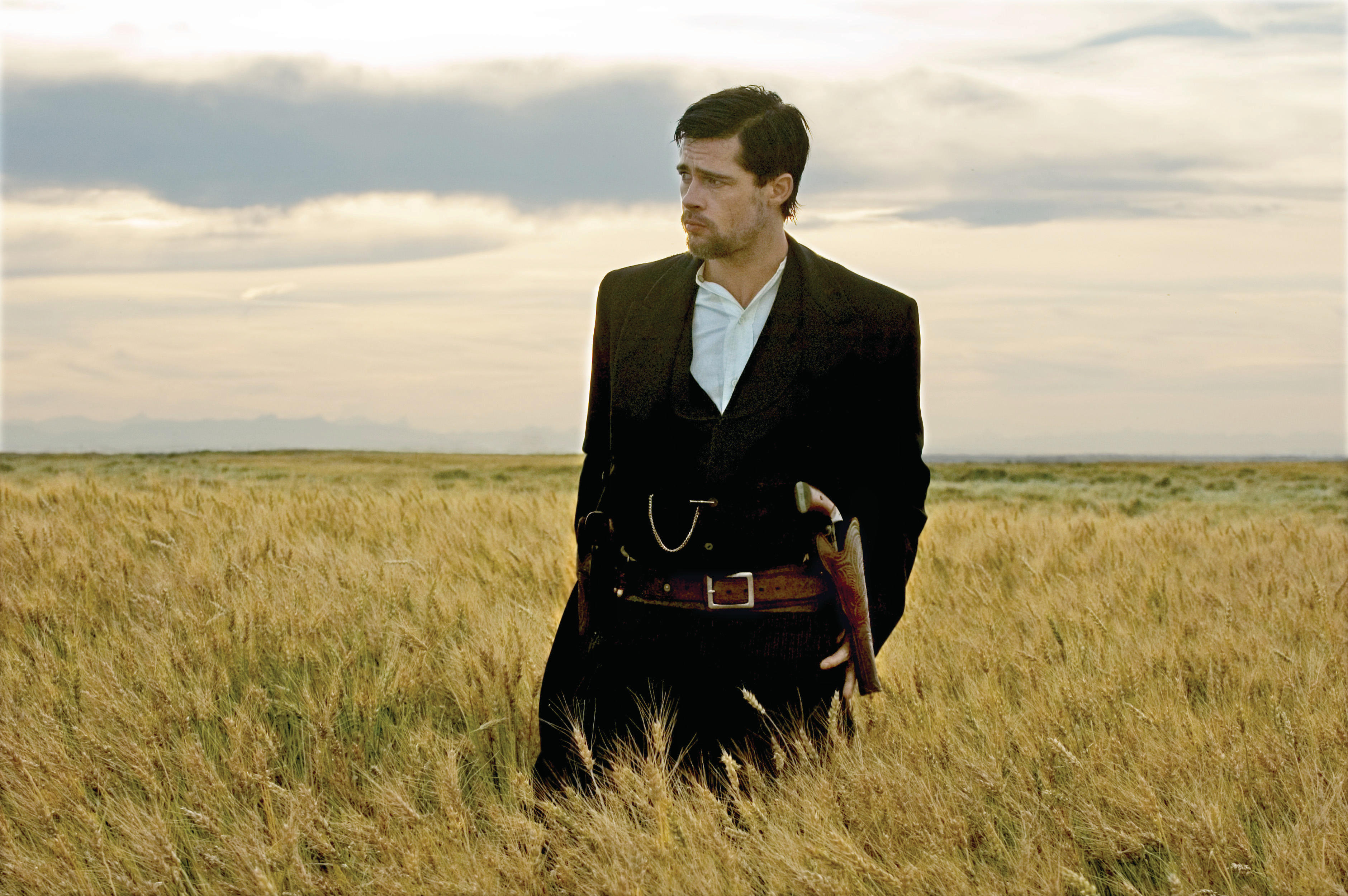
On a Saturday in late September, the gray hours were marked by occasional rains, and Kevin, having completed his affairs of commerce the evening prior and having no social prospects on the calendar, traveled to the theater on 68th St. to bask for a day in the fulgor of the cinematograph. And so it was that, three films into his personal odyssey, he came upon Andrew Dominik’s The Assassination of Jesse James By the Coward Robert Ford, a recount of the last days of one of the Old West’s most famous killers, and an analysis of the man who laid him low. Kevin found it to be an overly protracted and ultimately uneven work, to be sure. But he also found the movie often striking and occasionally beautiful, and — even if its reach exceeded its grasp — he admired the film for its ambition, and its confidence in taking extended, leisurely digressions. Kevin applauded Dominik’s attempt to pay homage to the films of Terrence Malick and to the sprawling psychological westerns of the 1970s. That being said, he found the interminable voiceover by Basil Exposition — which often needlessly described the action Kevin could witness for himself on the screen — more than a little irritating…
Thanks, Basil, I’ll take it from here. As Assassination begins, the James gang — or, more to the point, the gaggle of local toughs Frank (Sam Shepard) and Jesse (Brad Pitt) James have assembled for one last train heist in Blue Cut, Missouri — are waiting out the day in the woods. During this stopover, the weaselly wannabe Robert Ford (Casey Affleck), nursing a lean and hungry look, tries desperately to ingratiate himself with the celebrity brothers in turn. (If we couldn’t figure out from the title what part Ford will play in all this, he seems like trouble right from the get-go: one part Mark David Chapman (“I can’t shoot him like this. I wanted to get the autograph.“), one part Sirhan Sirhan (“I have achieved in one day what it took Robert Kennedy all his life to do.”)) And yet, through sheer dogged obsequiousness, Ford eventually manages to fall in with younger brother Jesse, who seems both amused by his blatant hero-worship and nonchalant about the quality of his riding partners. So, for the next two hours plus, we follow the twists and turns of Jesse and Robert’s doomed relationship, particularly as it becomes strained by James’ increasing (and justifiable) paranoia and Ford’s own delusions of easy immortality. And, as we eventually get to that fateful day when the shot is fired (and the years beyond), Ford slowly comes to discover that it’s one thing to kill a man. It’s another to live with yourself afterward.
Assassination definitely isn’t going to be everyone’s cup of tea, and, to be honest, it’s really not at the level that its pretensions seem to warrant: The film never achieves the psychological depths it purports to plumb — Ford in particular seems a pretty straightforward nutjob — and it runs for several beats too long. (The movie should already have ended two or three times over by the time Zooey Deschanel shows up.) And, then, of course, there’s that awful narration, which comes across as screenwriting on autopilot and nine times out of ten feels jarring and unnecessary. (I assume the passages come from the book by Ron Hansen, but they don’t work here at all. They either repeat — or worse, contradict — what we’re seeing. For example, the voiceover tells us in the first ten minutes that Jesse James was a constant blinker, after which Brad Pitt stares at things with an unfaltering, steely blue gaze for three hours.)
That being said, with some wonderful cinematography by Roger Deakins (who also shot In the Valley of Elah) and a solid, colorful cast, Assassination does have its moments. It’s always grand to see Sam Rockwell, and he’s quite commendable here as Bob’s older brother Charlie. (And, while he at first appears to be a mere buffoon, there’s more to him as the movie goes along.) Deadwood‘s Garret Dillahunt also adds another finely-honed cowboy to his western repertory here: His Ed Miller, an outlaw sadly operating a few cards short of a full deck, is a far cry from both Jack McCall and Frances Wolcott, but memorable nonetheless. And there’s plenty of other good work here, including outlaw turns by Jeremy Renner (of 28 Weeks Later), Paul Schneider (looking like the lost Fiennes brother), and, of course, Affleck and Pitt, both of whom bring their A-games to the table (even if Pitt’s motivations in his final moments escaped me.) Also, I’m forced to admit, I was rather tickled by the mean old cuss they acquired to play the Governor of Missouri…
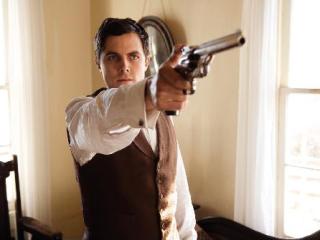
Life in the So-Called Space Age.
“If the current proposals to restart human exploration fail politically, indeed, the human space flight endeavor conducted under government auspices might well lose its momentum. I obviously hope that doesn’t happen. But it’s far from a slam dunk that we’re going back to the Moon and on to Mars.” Two companion pieces to today’s reflection on 50 years of Sputnik which I missed earlier: The Grey Lady hypothesizes about the next fifty years of space travel (suggesting its future as a public enterprise might be dubious) and takes a moment to consider the pop culture ramifications of the space age. “‘At the level of government, I think we’re still struggling as to why we’re sending people to space,’ Dr. Logsdon said. ‘It’s a decent question, and I think it’s an unanswered question.’” (My answer to this question, for what it’s worth, is here.)
She Ain’t Like Ike.
“Bush has long taken solace in the example of Harry S. Truman, whose foreign policy was deeply unpopular in his time but is now recalled as far-sighted and sage. Now Bush is stretching the comparison still further beyond the historical pale.” After (Dem strategist?) Dubya hints that a forthcoming Clinton presidency will play Ike to his Truman, Slate‘s Fred Kaplan cries foul. If the next prez channels Eisenhower, Kaplan contends, “it would be not as a continuation of Bush’s Truman but rather as a reversal of Bush’s Dulles.“
The Illustrated Man.
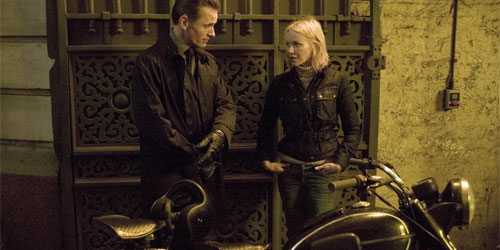
The King of the West may be a man of the East in David Cronenberg’s London gangster flick Eastern Promises, but — Anduril or no — he’s no less handy in a tight spot. As with Mortensen and Cronenberg’s last collaboration, A History of Violence, I found Promises to be a sleek and rousing genre exercise that’s being more than a little overpraised. I enjoyed the film, it’s worth catching if you have the stomach for it, and its steam bath centerpiece will be talked about for a good long while. But, to be honest, there’s really not much there there. Remove that fight from the equation and you’re basically left with sizable helpings of immigrant and gangster cliche. (Cronenberg seems to know as much — he tips his hand in the campy accordionist scene.) Naomi Watts is a fine actress, but she’s not given anything to do here besides tote around the film’s two Maguffins. Armin Mueller-Stahl, the Russian godfather of the tale, plays the same avuncular-going-on-sinister note throughout. And, while exemplifying the adage “still waters run deep” once again, Viggo’s character is almost too much of an archetypal badass — You can see the twists and turns in his story coming a mile away.
After a grisly assassination in a barber shop that’d do Sweeney Todd proud (just to let you know we’re in Cronenberg territory), Eastern Promises opens with the death of a young, drugged-out, and pretty clearly abused Russian teenager in a London hospital…and the subsequent birth of her child. (Speaking of Cronenberg territory, he films the newborn baby like it’s something out of Existenz.) Having lost her own pre-born of late, Anna Khitrova (Watts), the midwife in attendance, takes a shine to this orphaned child, and thus sets out with the dead girl’s diary to locate the foundling’s proper home. Anna’s (sort of) ex-KGB uncle takes one look at this untranslated journal and warns of a dangerous road ahead. Nonetheless, Watts’ investigation quickly takes her to a Russian restaurant run by Mueller-Stahl, an Old World type of fellow who’s clearly something of a n’er-do-well despite his fantabulous borscht. Soon enough, Anna also stumbles upon Mueller-Stahl’s flamboyant, hard-drinking Dauphin of a son (Vincent Cassel) and his assigned playmate Nikolai, a stoic, tough-as-nails chauffeur (Mortensen). And when it inevitably turns out that Mueller-Stahl et al are actually part of the feared vory v zakone (a.k.a. the Russian cosa nostra), the fates of Anna, the baby, the diary, and all involved come to rest in the hands of one enigmatic, very tattooed, and possibly conflicted driver…but what’s his angle? Let’s just hope the Russians love their children too.
I’m not going to spill Viggo’s secrets here, tovarisches, although you can probably guess he’s not one to just up and off a baby when called upon to do so. (Also, if this sounds a bit like Dirty Pretty Things, it may be because the films share a screenwriter.) Nonetheless, most of the buzz surrounding Eastern Promises justifiably centers on a fight scene in the middle going, when Viggo, naked as the day he was born, is confronted by two mobsters who don’t have his best interests at heart. It’s hard to say whether this gory steam room fracas is better than the splendid hand-to-hand duel in The Bourne Ultimatum, but it’s up there. If that deft, practiced, lightning-quick Bourne melee was a stiletto, this brutal scene packs the visceral, bone-crushing crunch of a mace. It’s also extremely hard to watch, and not because of Mortensen’s dangly bits — let’s just say David Cronenberg and sharp objects are involved. (Call me a lover, not a fighter, but when it comes to this director pushing the envelope of the R-rating, I prefer History‘s sex scenes with Maria Bello to nude, bloody Viggo plunging knives into people’s soft parts. But, to each his own.)
A Culture of Life?
“This is probably one of the most important cases in decades as it relates to the death penalty.” Now we’ll really see how pro-life they are…the Supreme Court agrees to hear a case on the constitutionality of lethal injections.
This is Radio Sputnik.
“It was the sound of wonder and foreboding. Nothing would ever be quite the same again — in geopolitics, in science and technology, in everyday life and the capacity of the human species.” On the eve of its fiftieth anniversary (Oct. 4), the NYT remembers the Sputnik launch. “It was an unprepossessing agent of alarm. A simple sphere weighing just 184 pounds and not quite two feet wide, it had a highly polished surface of aluminum, the better to reflect sunlight and be visible from Earth…The Russians clearly intended Sputnik as a ringing statement of their technological prowess and its military implications. But even they, it seems, had not foreseen the frenzied response their success provoked.”
Tales of the South.
The trailer for Richard Kelly’s much-anticipated Southland Tales, starring Dwayne “The Rock” Johnson, Seann William Scott, Sarah Michelle Gellar, Mandy Moore, Justin Timberlake, Miranda Richardson, Cheri Oteri, Janeane Garofolo, Nora Dunn, Jon Lovitz, Kevin Smith, Amy Poehler, John Larroquette, Bai Ling, Wallace Shawn, Christopher Lambert, and Wood “Avon Barksdale” Harris — Yeah, I know, weird, right? — is now online. I just hope it’s more like the theatrical Donnie Darko than it is the director’s cut.
No Country for Young Men.
 [Review, take 2.] Every day I think I’m going to wake up back in the desert… I must say, I went in expecting not much more than an over-the-top “message movie” schmaltzfest, or at best a harmless helping of mediocre, inert Oscar Bait like Cinderella Man or A Beautiful Mind. But Paul Haggis’ In the Valley of Elah, the first of four(!) movies I caught last Saturday, turned out to be quite a bit better than I expected. Rather, Elah is a melancholy rumination on the hidden casualties of (any) war and a somber inquiry into the heavy toll exacted on the wives, parents, and children of military men. (The families of military women will likely get their due in John Cusack’s forthcoming Grace is Gone.) The David and Goliath nonsequitur of its title notwithstanding, Elah more often brings to mind the questionable sacrifice for an unknown higher purpose in Abraham and Isaac, or the bloody fate of erstwhile brothers Cain and Abel. And, biblical parallels aside, the film showcases the best work Tommy Lee Jones has done in years. (Well, I didn’t see The Three Burials of Melquiades Estrada, and have high hopes for No Country for Old Men.) And it’s probably the most engaging police procedural of the year this side of Zodiac.
[Review, take 2.] Every day I think I’m going to wake up back in the desert… I must say, I went in expecting not much more than an over-the-top “message movie” schmaltzfest, or at best a harmless helping of mediocre, inert Oscar Bait like Cinderella Man or A Beautiful Mind. But Paul Haggis’ In the Valley of Elah, the first of four(!) movies I caught last Saturday, turned out to be quite a bit better than I expected. Rather, Elah is a melancholy rumination on the hidden casualties of (any) war and a somber inquiry into the heavy toll exacted on the wives, parents, and children of military men. (The families of military women will likely get their due in John Cusack’s forthcoming Grace is Gone.) The David and Goliath nonsequitur of its title notwithstanding, Elah more often brings to mind the questionable sacrifice for an unknown higher purpose in Abraham and Isaac, or the bloody fate of erstwhile brothers Cain and Abel. And, biblical parallels aside, the film showcases the best work Tommy Lee Jones has done in years. (Well, I didn’t see The Three Burials of Melquiades Estrada, and have high hopes for No Country for Old Men.) And it’s probably the most engaging police procedural of the year this side of Zodiac.
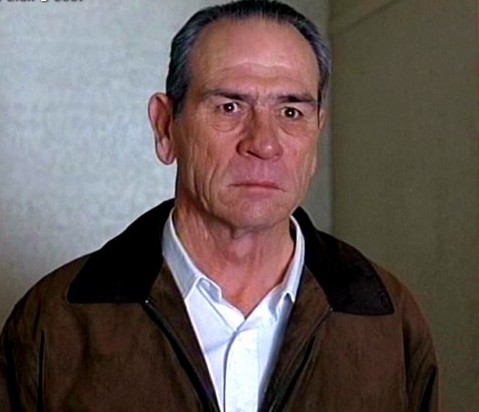 “Dad?” Roused from a dream he can barely grasp the edges of, grizzled Vietnam Vet turned mechanic Hank Greenfield (Jones) is awoken one Tennessee morning by a call from faraway Fort Rudd, informing him not only that his son Mike is back from Iraq but has gone AWOL since getting back stateside. This doesn’t gibe with Hank, who’s been receiving image-laden e-mails from his second son during his tour (his first son already perished in his nation’s service), and so he packs his bags, kisses his wife (Susan Sarandon) goodbye, and drives straight through to New Mexico, looking to ascertain the score.
“Dad?” Roused from a dream he can barely grasp the edges of, grizzled Vietnam Vet turned mechanic Hank Greenfield (Jones) is awoken one Tennessee morning by a call from faraway Fort Rudd, informing him not only that his son Mike is back from Iraq but has gone AWOL since getting back stateside. This doesn’t gibe with Hank, who’s been receiving image-laden e-mails from his second son during his tour (his first son already perished in his nation’s service), and so he packs his bags, kisses his wife (Susan Sarandon) goodbye, and drives straight through to New Mexico, looking to ascertain the score.
The sergeant on duty at Ft. Rudd (James Franco) and Mike’s returning platoon members all think he’s just shacked up with a good time woman somewhere…but Hank’s not so certain. And, just as he’s beginning to tease clues off Mike’s damaged cameraphone, a charred, mutilated, and dismembered body is discovered on the outskirts of town. Sure enough, it’s Mike, and as the ensuing homicide investigation slips into the jursidictional crack between local law enforcement (most notably represented by Charlize Theron) and the Military Police (headed by bureaucrat Jason Patric), Hank takes it on himself to bring his son’s murderer to justice. But, as Hank well knows, the dogs of war impart a moon-touched madness on those they’ve mauled, and Hank will be forced to confront some ugly truths about his son, and the man he became in Iraq, in order to get to the bottom of things.
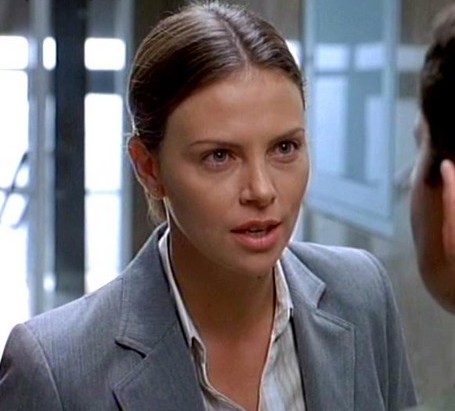 Admittedly, the movie starts out kinda rocky (or perhaps I was just gunning for Haggis in the first reel.) Events occur early on that scream symbolic significance (you’ll know what I mean), people speak in characterization shorthand — “Someday, you’ll just have to trust somebody, Hank” — and some plot points just don’t hang together. How did Hank ever find that (symbolically-named) computer guru operating out of a van, and why does it take him so ever-loving long just to do a defrag? But, for whatever reason — my money’s mostly on Jones — Elah is a significantly subtler and more resonant film than I ever expected from the writer-director of the lamentable Crash. (Then again, a ball-peen hammer to the skull is subtler than Crash, a film which, as I noted in my review of Inside Man last year, feels like it was made by and for people who don’t get out very much.)
Admittedly, the movie starts out kinda rocky (or perhaps I was just gunning for Haggis in the first reel.) Events occur early on that scream symbolic significance (you’ll know what I mean), people speak in characterization shorthand — “Someday, you’ll just have to trust somebody, Hank” — and some plot points just don’t hang together. How did Hank ever find that (symbolically-named) computer guru operating out of a van, and why does it take him so ever-loving long just to do a defrag? But, for whatever reason — my money’s mostly on Jones — Elah is a significantly subtler and more resonant film than I ever expected from the writer-director of the lamentable Crash. (Then again, a ball-peen hammer to the skull is subtler than Crash, a film which, as I noted in my review of Inside Man last year, feels like it was made by and for people who don’t get out very much.)
In any case, Tommy Lee Jones is really excellent here: Check out the scene where he has to ID his son’s body in the morgue, or note how his early military rectitude seeps away as he sinks into the slough of despond. And Jones isn’t alone. Sarandon is memorable in every short scene she’s in, Theron is surprisingly believable as an ordinary (albeit beautiful) cop, and Patric — a dependable actor who never quite made it as a lead — seems to relish the freedom of his oncoming, paunchy Val Kilmer/Alec Baldwin phase. His “on a need to know basis” character in particular could’ve been way over the top, but Patric underplays him as a guy who really just doesn’t want to do the paperwork. (There’s also a brief but solid turn by Josh Brolin, Jones’ Coen compadre, as the local sheriff.)
Elah isn’t the best movie of the year or anything. But it is most of everything you’d want out of a fall film — It’s timely, sober-minded, well-acted and well-made. And, if nothing else, it shows Haggis has the ability to reboot after Crash.
